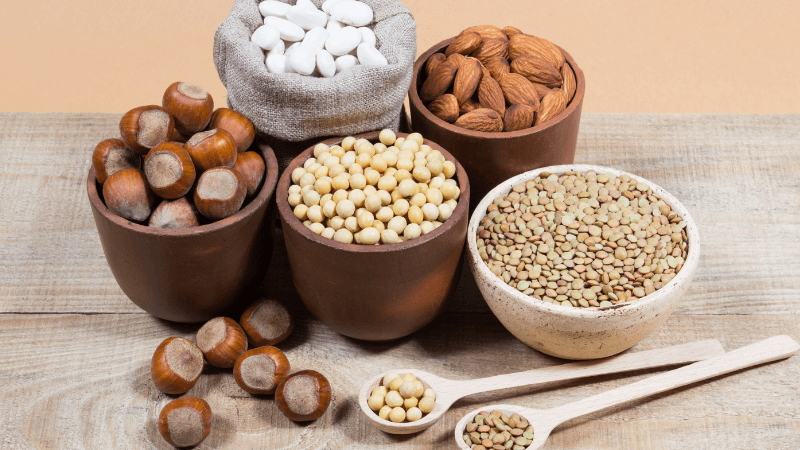Protein is an essential part of every diet and is vital for good health and wellbeing. Proteins contain small building blocks called amino acids that assemble, maintain and repair all cells and body structures. For example, the immune cells and hormones are all made of proteins; bones, skin, hair and nails are mostly built of proteins.
Plants and animals both provide us with dietary proteins but there are differences in how we can utilise them. Also, there are many different views, opinions and arguments about benefits of eating plant protein vs animal protein.
This blog discusses and lists the top plant-based proteins and how to optimally include them in a balanced diet to restore gut health.
Plant proteins vs animal proteins
To start with, let’s remember that eating protein from any source alone is not enough! Importantly, you must be able to digest protein well and also ensure a sufficient variety by getting a good supply of the nine essential amino acids. These can’t be made by the body itself and have to be obtained from foods. Proteins from animal sources supply the body with all nine essential amino acids at optimal levels. The term “complete protein” is often used to describe this type of protein.
Although the vast majority of best plant-based proteins contain ALL of the amino acids, some of them are at low levels. Therefore, plant proteins are referred to as “incomplete” proteins.
Fortunately, both clinical evidence and research have found that those following a plant-based diet are able to get the protein they need from non-animal sources. However, doing so often requires a good level of nutrition knowledge to do it effectively and avoid potential deficiencies. This includes meal planning and preparation and, if done incorrectly, may lead to long-term nutritional imbalances leading to compromised health.
Many plant foods are high in good quality protein (some are ‘complete proteins’). So, they make great options for either vegan or vegetarian diet, or as addition to a more common animal food diet.
Moreover, let’s not forget that it is also essential to look beyond the protein content of the foods and consider other health benefits as well. These factors should include their content of amino acids, carbohydrates and fats they provide, and the number of vitamins, minerals and other key plant chemicals vital for good health.
Luckily, there are plenty of tasty plant-protein options out there!
Top plant-based proteins
Here are the best plant-based foods with high protein levels, whether you’re making a dietary switch to vegan/ vegetarian diet or just looking to add variety and good nutrition options to your typical meals.
HEMP
These low-calorie, high-energy seeds contain all essential amino acids (i.e. are a complete protein) and have a pleasant, mild, nutty flavour. Around 3 tablespoons of hemp seeds provide 10g or so of protein. Hemp seeds are also a very good source of fibre and heart protective omega-3 fatty acids. Add them to a smoothie or porridge, mix them into bliss balls, or stir them through yoghurt. Hemp seeds are also available in powder form, making it super-easy to add a spoonful to just about any dish you’d like. Just be mindful not to add them to hot foods as the proteins will be denatured i.e. will change structure and become much less nutritious. Hemp definitely is in one of the top plant-based proteins on this list!
CHIA SEEDS
Just like hemp, chia seeds provide a complete source of protein. Having a neutral flavour, they can be added to all sorts of recipes, from casseroles and soups to drinks and salads, or desserts (chia puddings are great!). Find out more about the many other benefits of chia seeds in my post here (it also includes recipes and tips).
CHICKPEAS
Chickpeas (or garbanzo beans) are a tasty and highly versatile source of top plant-based protein. They can be eaten hot or cold. Try adding them to soups, pasta bakes, curries, or roast them gently with a little bit of cumin, paprika and Celtic salt for a delicious snack.
Hummus, which is made by blending chickpeas, tahini (sesame butter) and lemon juice, is a delicious and nutritious dish to have in the fridge for quick snacks. Eat it with raw vegetables, as a sauce or dressing, add to a marinade for vegetable kebabs, or as a spread on sandwiches or crackers.
QUINOA
Quinoa must be on any list of top plant-based proteins! It is an easy and nutritious substitute for pasta or rice. It is also a very good source of complete protein (it contains all nine essential amino acids), along with plenty of fibre, iron, manganese and relaxing magnesium. Quinoa is very versatile and can be used throughout the day – quinoa porridge in the morning, cooked quinoa in salads or soups for lunch and for dinner in place of pasta (there are also quinoa pastas if you like). Check out my quinoa recipes for breakfast, lunch and dinner HERE.
LENTILS
They are an inexpensive, practical and nutritional option to add an extra boost of top plant-based protein to soups and salads. Incorporate lentils as the protein portion in a vegetable soup or in veggie burgers. There are many delicious dahl recipes on the internet to check out! Utilise all colours – green, brown, orange lentils to get different beneficial plant chemicals, types of fibre and essential minerals. Lentils are also a great food to feed the good bacteria in the gut – your microbiome.
BEANS
All types of beans are good sources of protein, fibre and many minerals and vitamins. They are also filling and help with weight loss/ control. Add beans to salads, soups, stir-fries and stews. Choose organic varieties (either canned or dry). If cooking from scratch with dry beans, definitely soak them overnight in water containing kombu (seaweed), to remove phytochemicals that make beans hard to digest and cause flatulence.
PEAS
Green, yellow or split peas are all tasty and easy to cook. They contain lower amount of protein per serving than most beans and on their own are not classified as complete proteins. However, if you eat them with rice or quinoa, you’ll get all nine essential amino acids in one meal!
Peas are great in soups, vegetable burgers and in salads. For example you can make two versions of a delicious split pea soup: one with ham/ bacon, and a vegetarian one replacing ham with smoked paprika (yummy!).
BUCKWHEAT AND MILLET
Grains are also relatively good sources of protein but they can be problematic for many people with gluten sensitivity. Therefore, I often recommend focusing on gluten-free grains such as buckwheat or millet to add grain-based plant protein to your diet. Another option to consider is amaranth (technically a seed).
NUTRITIONAL YEAST
These truly are a top plant-based protein option! Nutritional yeast has a nutty flavour and are used as plant-based alternative to cheese or creamy sauces. Unlike live yeast that causes bread to rise, nutritional yeast is treated with heat which kills the yeast cells and is suitable for most people sensitive to yeast. It also contains good amount of natural B vitamins that can be effectively used instead of supplementing with synthetic B vitamins. Sprinkle it on pasta or pizza instead to cheese or mix with water, salt and olive oil, heat in a pan and pour over cooked vegetables or pasta.
NUTS AND SEEDS
All nuts contain varying degrees of protein but because of their high fat content, they are classified as good fats rather than protein sources. Peanuts (technically a legume) contain most protein, followed by almonds and pistachios. Macadamia nuts contain the lowest amount of protein.
Best have them as snacks, sprinkle on salads, in smoothies, or use in baking to replace gluten-containing flours (e.g. almond meal). Pumpkin seeds and sunflower seeds are also valuable sources of plant protein. The list also includes flaxseeds and sesame seeds. Sprinkle them over a porridge, eat as snacks or add to smoothies.
SOY
Soy also is a top plant-based protein source but nowadays it needs to be used sparingly (a few times per month) and organic only, as most soy products are unfortunately made of genetically modified soy. Good options include tofu, tempeh and edamame (green soybeans). Tofu and tempeh blend easily with both savoury and sweet flavours, so can be used as either a main meal protein source or in desserts.
PLANT PROTEIN POWDERS
Most common plant-protein powders are made of pea, rice or hemp. While protein supplements can assist those who have high protein needs, such as athletes who are vegetarians, it is best for most dietary protein to come from whole foods.
The above short summary of top plant-based proteins was developed as a practical guide for my clients who often ‘get stuck’ when asked to include plant-sources of protein in their diet. Initially many of them are even afraid they’ll have ‘nothing to eat’ if they need to limit animal proteins!
As an experienced nutritionist, I help and guide my clients to find the right eating pattern, best overall protein choices, and personalised nutrition approach to feel good and full of energy daily.
If you have been searching for an online nutritionist in Sydney helping clients located anywhere in Australia, please feel free to get in touch!
Book an online consultation now or click on the button below to arrange a free 25-minute initial discussion to talk about your circumstances and how I can help.
I look forward to helping you get better health and wellbeing soon!
Best of health
Joanna Sochan
Wholistic Health and Lifestyle Therapist
Natural and Lifestyle Therapies for Abundant Health and Wellbeing
Additional resources
- What are lectins and when to limit or avoid them
- Autoimmunity and food sensitivities – a case study
- Optimal gut health diet plan – a case study
- Smoothie recipes: How to make quick and healthy smoothies
Disclaimer: The above material is for informational and educational purposes only. It should not be used to self-diagnose and it is not a substitute for a medical advice, diagnosis, treatment, prescription or recommendation. All viewers of this content, especially those taking prescription or over-the-counter medications, should not make any changes in their health regimen or diet before first consulting a doctor or other qualified health provider with any questions they may have regarding a medical condition or their particular circumstances.
 Joanna Sochan is a Natural Therapist and founder of Naturimedica Wholistic Wellcare. She has a passion for helping clients transform their lives by becoming healthy and well naturally. Joanna has 14+ years experience in clinical practice and has special interest in solving complex cases, gut health, food sensitivities, hormone imbalances, autoimmune disorders and weight loss. She helps clients individually (mostly online) Australia-wide and also offers online therapeutic programs, eCourses and self-help eBooks. View full bio.
Joanna Sochan is a Natural Therapist and founder of Naturimedica Wholistic Wellcare. She has a passion for helping clients transform their lives by becoming healthy and well naturally. Joanna has 14+ years experience in clinical practice and has special interest in solving complex cases, gut health, food sensitivities, hormone imbalances, autoimmune disorders and weight loss. She helps clients individually (mostly online) Australia-wide and also offers online therapeutic programs, eCourses and self-help eBooks. View full bio.
 Print This Post
Print This Post 


Leave A Comment